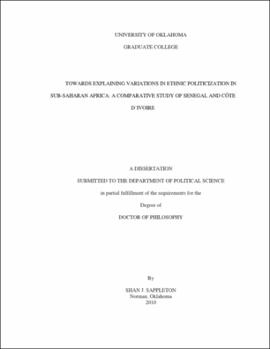| dc.contributor.advisor | Smith, Mitchell P. | |
| dc.creator | Sappleton, Shan J. | |
| dc.date.accessioned | 2019-06-03T20:36:17Z | |
| dc.date.available | 2019-06-03T20:36:17Z | |
| dc.date.issued | 2010 | |
| dc.identifier | 998774602042 | |
| dc.identifier.uri | https://hdl.handle.net/11244/320244 | |
| dc.description.abstract | This dissertation examines in the conditions under which ethnicity becomes politicized in heterogeneous societies: how, and in what ways do political institutions matter? How, and what kinds of political institutions constrain or provide incentives for the use of ethnic identity as a primary mobilizational tool? Many answers to this question focus on the role of formal political institutions (colonial, post-colonial, democratic transition). As in most of the developing countries, however, informal institutions play a crucial role in African politics. To the extent that the rules of the political game governing representation and access to government resources are determined by informal institutions (e.g., institutions of social integration), these rules should be central to any explanations of ethnic politicization or the lack thereof. | |
| dc.description.abstract | Drawing on and extending existing theories and analytical frameworks on formal institutions, the dissertation considers the interactive effects of informal political institutions on the forms and outcomes of ethnic mobilization in sub-Saharan Africa. The dissertation finds that informal institutions (e.g., the Sufi Orders in Senegal and voluntary associations in Côte d'Ivoire) and informal institutional rules (e.g., ethnic transcendence and ethnic balancing) can directly affect the politicization of ethnicity. Change in these informal institutional rules may lead to shifts in the political salience of ethnic identity--from low or dormant and contained to dominating the national discourse-- altering incentives for political elites to use ethnic identity as a primary mobilizational tool. | |
| dc.format.extent | 278 pages | |
| dc.format.medium | application.pdf | |
| dc.language | en_US | |
| dc.relation.requires | Adobe Acrobat Reader | |
| dc.subject | Ethnic relations--Case studies | |
| dc.subject | Ethnic relations--Senegal | |
| dc.subject | Ethnic relations--Côte d'Ivoire | |
| dc.subject | Polarization (Social sciences)--Case studies | |
| dc.subject | Polarization (Social sciences)--Senegal | |
| dc.subject | Polarization (Social sciences)--Côte d'Ivoire | |
| dc.subject | Ethnic relations--Political | |
| dc.title | Towards Explaining Variations in Ethnic Politicization in sub-Saharan Africa: A Comparative Study of Senegal and Côte'Ivoire | |
| dc.type | text | |
| dc.type | document | |
| dc.thesis.degree | Ph.D. | |
| ou.group | College of Arts and Sciences::Department of Political Science | |
